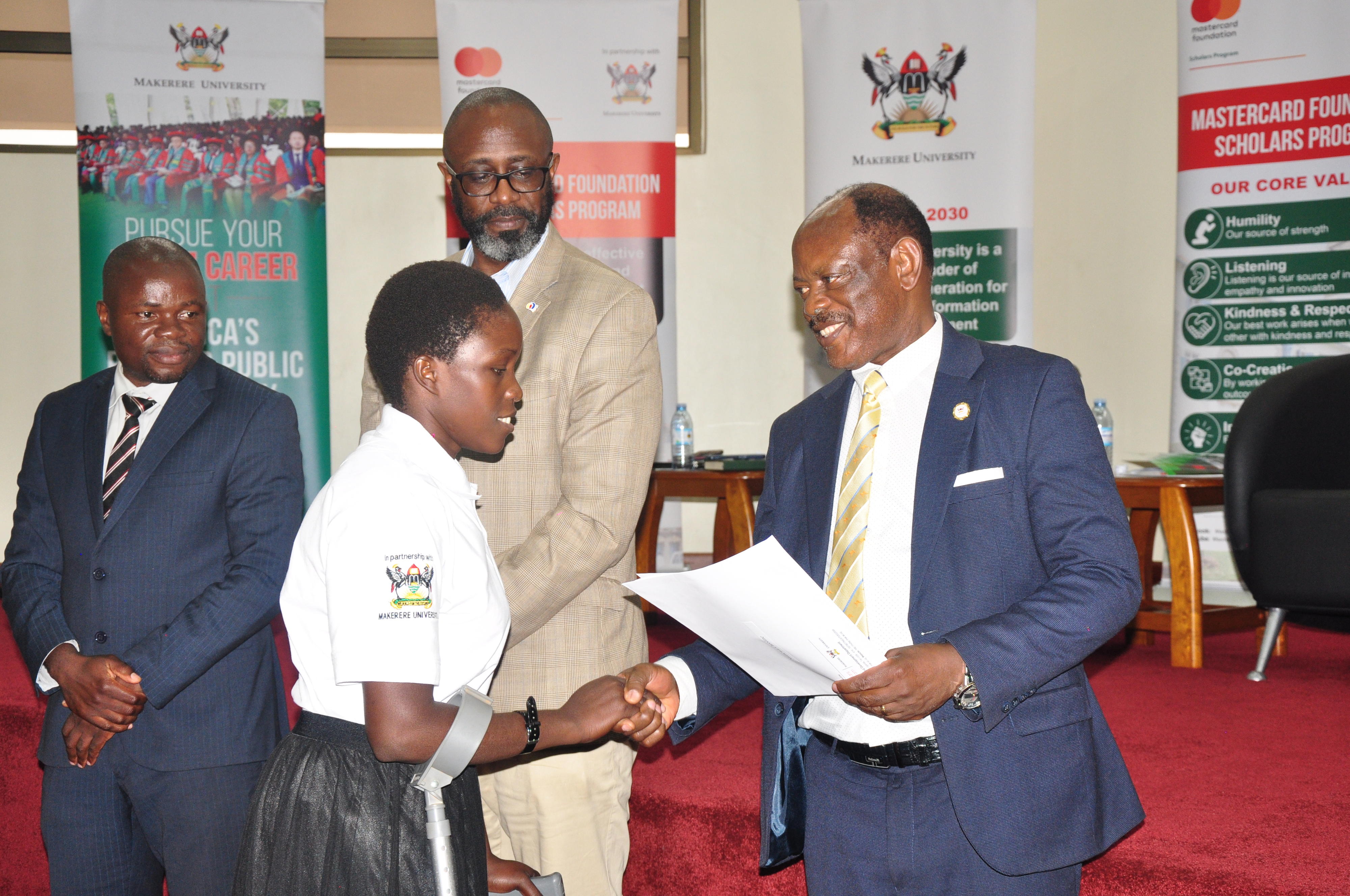Prime
Opportunities for varsity underprivileged students

Prof Barnabas Nawangwe, Makerere University vice chancellor shakes hands with Caroline Nakacwa, one of the MasterCard beneficiaries. Below Beneficiaries listen to the vice chancellor. PHOTO | NOELINE NABUKENYA
What you need to know:
- Some scholars had given up on education until MasterCard Foundation scholarship scheme came in handy.
At least 1,000 students are expected to be awarded MasterCard Foundation scholarships to pursue their studies in undergraduate programmes (Bachelor’s degrees) and postgraduate programmes (Master’s degrees) for the next 10 years. The scholarship programme aims at creating free education opportunities for bright but financially disadvantaged students to further their studies.
“I congratulate you upon attaining the scholarships and I urge you to appropriately use the opportunities to change your societies,” Prof Barnabas Nawangwe, Makerere University vice chancellor said.
The VC encouraged students to utilise their time at the university and finish their programmes in the fixed duration.
“Study well and return to your communities and contribute to your family, build the country and the continent,” Prof Nawangwe said to the scholars on August 20. During the awarding ceremony, he revealed that 100 scholars have been admitted to the institution under Mastercard Foundation scholasrship for 2024/2025 academic year.
This is the first cohort for the next 10 years since this programme was renewed in December 2023.
Prof Justine Namaalwa, the programme director, noted that out of 100 students who received the scholarship, 31 percent are refugees, 11 percent are persons living with disabilities (PWDs), and 13 percent are from refugee-hosting communities.
Similarly, six percent are international students, 14 percent transition from schools in highly ranked poor districts, and 25 percent from other districts.
“We selected students from 46 districts across the country. Eligible candidates for this programme went through stiff competition,” she said, before handing over scholarship awards to scholars.
Dr Mike Ibrahim Okumu, chairperson of the selection committee, revealed that they received more than 4,000 applications for the 95 undergraduate available slots. From this huge number, 1,809 students were admitted to Makerere University and Makerere University Business School (MUBS).
In the same vein, graduate scholars totalling to 811 applied for this programme. Of these, 336 were admitted to Makerere University. Of this number, 187 students were female and 149 male, but only five graduate scholars were selected.
“These numbers are more than the scholarship opportunities available, meaning to be selected, you are the most deserving and don’t take this for granted,” Mr Okumu said.
Beneficiaries
Scholars lauded MasterCard Foundation for the scholarships that have given them a chance to have a shot at education. A section of these students revealed they learnt about the opportunity through their former schools.
The scholarship aimed at deepening inclusive quality education and transformative leadership of the young generation has made the dreams of the young generation true.
Caroline Nakacwa, a scholar living with disabilities, sat her Uganda Advanced Certificate of Education exams in 2021 but has been home due to lack of tuition.
“My parents could not afford my university education yet my dream was to join Makerere University on a sponsorship but MasterCard had suspended admission since the outbreak of Covid-19,” she revealed.
The 23-year-old recounts the sleepless night trying to figure out life without a degree. Then, renewal of the contract between Makerere and the donor organisation in 2023 brought hope.
“I scored 14 points in History, Literature and Divinity (HLD/Computer Studies), but I did not qualify for the government scholarship. When MasterCard Foundation scholarships were advertised, I gave them a shot and I was successful,” Nakacwa explains.
She encourages students who are still at home to give it a try in the next advertisement.
Her mother Teo Nakitto appreciates Makerere for creating opportunities for the underprivileged and exercising transparency in the selection.
“My daughter has been at home for three years but I am grateful that she has reached this milestone. I encourage all the students here today, to take this seriously and excel,” she says.
For South Sudanese national Margaret Dut Laja could not believe her luck. Laja learnt about the programme while she was still in school. When she joined A-Level, her teachers constantly promoted this scholarship and encouraged her to apply.
“Have you ever completed a task and then wondered: “Now, what next?” Well, that is what it was for me. I came across many scholarships, but they were all for refugees and when Mastercard Foundation advertised, I was hesitant to apply as I imagined the stiff competition.”
“Towards the deadline, I finally took my time and applied, but then I forgot about it. I never expected to be called for interviews. To my surprise, I received a call,” she recounts.
Regina Napeyok, a scholar from Kaabong District in Karamoja, also learnt about the scholarship programme from her former school.
Napeyok says studying in hard-to-reach communities is tough, as students have to trek long distances to access schools, in addition to having parents who can barely afford boarding school fees.
“I come from a region where access to information is still very hard and if it were not for my former teacher, I would not be here,” Napeyok says.
She travelled from Kaabong to Kampala to apply for the scholarship and luckily went through.
Anthony Nsamba, another student, was admitted to pursue a Bachelor of Social Sciences under the scheme.
Upon completing Senior Six, Nsamba suffered lumbar scoliosis, a condition which causes a sideways curve in the lower (or lumbar) portion of the spine. He did not join university because his parents could not afford the cost.
However, while in high school, Nsamba’s career counsellor informed him about the scholarship scheme.
“I travelled to the university to obtain the application form but it was unavailable. I had to return later when the programme officially started to pick up the form,” he recounts. He adds that his leadership skills rendered him the opportunity.




